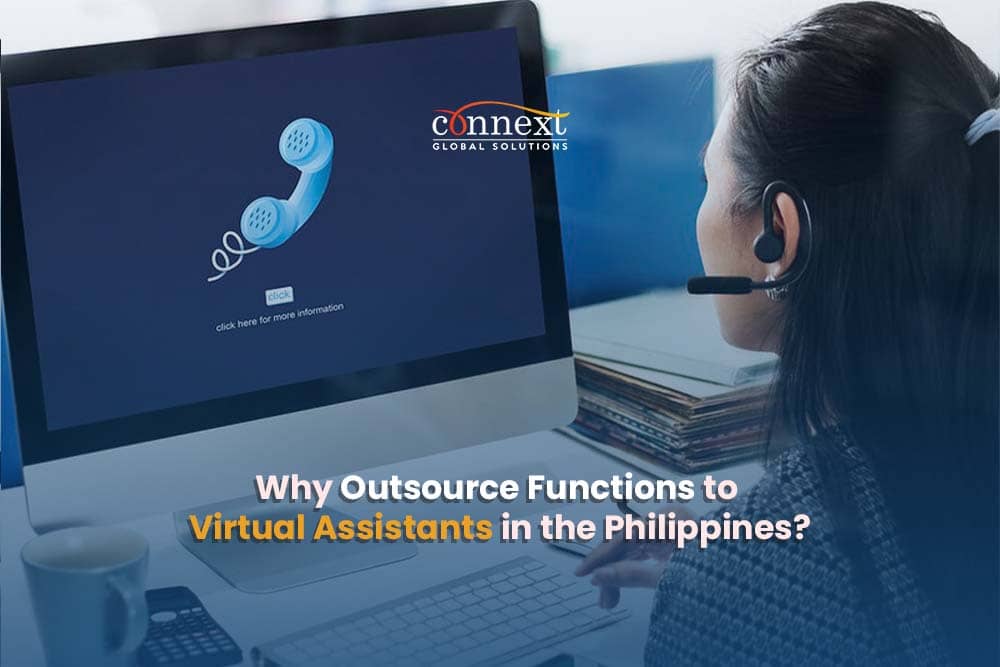The collective remote work mindset brought about by the COVID-19 pandemic has accelerated the need for remote virtual assistants, enabling seamless transition of outsourcing services and integrating virtual assistants into the business.
What is a Virtual Assistant?
Virtual Assistants, sometimes referred to as virtual office assistants, freelancers or gig workers, are contracted primarily to provide remote back-office support to a business especially in their non-core office functions. With a virtual assistant, businesses can outsource current functions that have established processes. A virtual assistant can either be working onsite at an offshore service provider facility or in a typical work-from-home setup.
One of the main concerns of businesses planning on hiring offshore Virtual Assistants is the timezone difference. This can be easily solved in a setup with virtual assistant who works remotely.
Countries providing offshore business process support like the Philippines already have countless established business process outsourcing providers (BPOs). There are over 700 BPOs in the Philippines alone – many of which specialize in the smaller, more agile needs of the Small to Medium Enterprise/ Small-Medium Businesses (SME/SMB) market. (Outsource Accelerator)
Filipinos are already familiar with the BPO setup and the corresponding need to adjust to the timezone required by the client. Virtual Assistants can easily adjust to your company’s operations and work flexible hours.
If you have a virtual assistant already onboard, you can leverage their services by assigning the assistant to a schedule that works best to optimize their role. Do you need them to report to work and process documents or their tasks in the same timezone as yours or would you prefer them to work on off-office hours? If you have a team of virtual assistants, do you prefer to have all remote team members working under the same assigned schedule or on alternate working schedules?
The great thing about having virtual assistants is you are in control of their schedule. You decide what works best to fit your business’ needs. You can define the processes, roles, tasks, assigned to your virtual assistant or the team as a whole.
Filipinos are used to the timezone difference and can adjust quickly to suit your operations, thus adding value to the business and improving client experience.
Why a Remote Virtual Assistant business model can work for you:
- Access to Top Talent
There are more than 100 million people in the Philippines. There is a large talent pool of employees who have worked for large multinational companies and business process outsourcing companies. With other geographies, it is hard to access a labor pool with that kind of experience.
- Convenient Approach
Integrating virtual assistants or a team of virtual assistants enables convenience to both the businesses and the staff. With digital tools and software, the remote staff can do countless tasks effectively and efficiently. Having a designated virtual assistant to support the business poses convenience since there is resource allocation.
- Availability
You can be guaranteed of readily available Customer Support with a Virtual Assistant model. Virtual Assistants can provide real-time support to your staff and customers.
- High Literacy rate and Excellent verbal and written communication skills
Filipinos can converse fluently in the English language. In fact, the Philippines is regarded as one of the largest English-speaking nations.
When it comes to literacy, ninety-four of every 100 Filipinos five (5) years old and over are basic literate in 2019, according to the results of the 2019 Functional Literacy, Education and Mass Media Survey (FLEMMS). (Philippine Statistics Authority)
What do I look for in a Virtual Assistant?
Virtual Assistants have the following basic competencies:
- Excellent time management skills
- Solid organizational skills
- Knowledge of online calendars and scheduling (e.g. Google Calendar)
- Able to handle all communications with the company from a remote position
- Familiarity with current technologies, like desktop sharing, cloud services, and VoIP
- Experience with word-processing software and spreadsheets (e.g. Microsoft Office)
What functions can I outsource to Virtual Assistants?
The nature of roles assigned to virtual assistants used to cover back-office and clerical tasks only. Now, the roles of virtual assistants have evolved to more specialized functions.
Entry-level virtual assistants are often given low-priority tasks or works under supervision until they gain enough experience or a client trusts them to handle more responsibility. Some typical tasks when outsourcing services to a virtual assistant are providing customer service as first point of contact. real-time support on administrative projects and deliver high-quality work under minimum supervision such as addressing/responding to administrative inquiries and/or phone calls, scheduling meetings, managing corporate schedules, making travel plans and issuing invoices, payment posting, data entry, bookkeeping, working to prioritize a client’s schedule, and various other computer tasks, such as answering emails, managing a contact list, preparing customer spreadsheets and keeping online records, organizing managers’ calendars, and typing memos or screening emails.
In some roles, duties may include conducting research, market research, creating presentations copywriting, graphic design, social media management, document research, project management, and making travel arrangements and accommodations.
Virtual Assistants with experience or background in specific industries like Information Technology, Accounting and Property Management can be given specialized functions. For Accounting virtual assistants, functions such as managing all accounting transactions and operations and financial activities, preparing and analyzing budget forecasts, publishing financial statements in time can be delegated. For property management functions, businesses can delegate the following functions: Lead Generation, Tenant Follow-ups, Property Valuation, Listing Updates, Assisting move outs to Managing rental listing.
Collaborative tools used by Virtual Assistants are Softwares on the following:
- Time Tracking
- Business Apps & File Sharing / Storage
- Social Media
- Scheduling
- Online Meeting Software
- Virtual Assistant Software
- Bookkeeping and Accounting
- Xero
- WorkflowMax
- MYOB
- Dynamics
- QuickBooks
- Zoho Books
Hire the Perfect Virtual Assistant through Connext Global Solutions
With a remote work model, most of business services can be easily outsourced in the Philippines. Long before COVID-19 accelerated the remote-ready work model, Connext Global Solutions has already established a remote-ready staffing model and has effectively provided talented virtual assistants to over 50+ satisfied clients.
The visibility and control in the virtual captive model creates the confidence to outsource tasks to a remote virtual assistant or a remote team. Learn more on the Connext Virtual Captive Model here.
Refine your outsourcing strategy by identifying key tasks for your team. Visit our blog post what to outsource to a virtual assistant to discover the most effective functions you can delegate to virtual assistants in the Philippines.
Connext Global Solutions can find the perfect virtual assistant for you. Get started with Connext today.
Expand your outsourcing strategy to include HR functions. Visit our blog to discover the benefits of outsourcing HR to PEO firms in the Philippines, providing a broader perspective on why outsourcing various functions to virtual assistants in the Philippines can be advantageous for your business.







